News

DFB extends contracts of Wück, Meinert and Bartusiak until 2029
The German Football Association (DFB) has extended the contracts of women’s national team head coach Christian Wück and his assistant coaches Maren Meinert and Saskia Bartusiak until August 2029.

Statement from the DFB Presidential Board
At its meeting today, the Presidential Board of the German Football Association (DFB) addressed recent public discussion around a potential boycott of the 2026 FIFA World Cup.

FIFA World Cup 2026™: Germany to Establish Team Base Camp in North Carolina
The German men’s national team will establish its Team Base Camp for the FIFA World Cup 2026™ in Winston-Salem, North Carolina. The squad will stay at The Graylyn Estate and train at Wake Forest University. Media center will also be based on campus.

Wück: “We can be satisfied with the results”
In an interview with DFB.de, Germany women head coach Christian Wück spoke about some of the highlights of the last year and the development of his team.
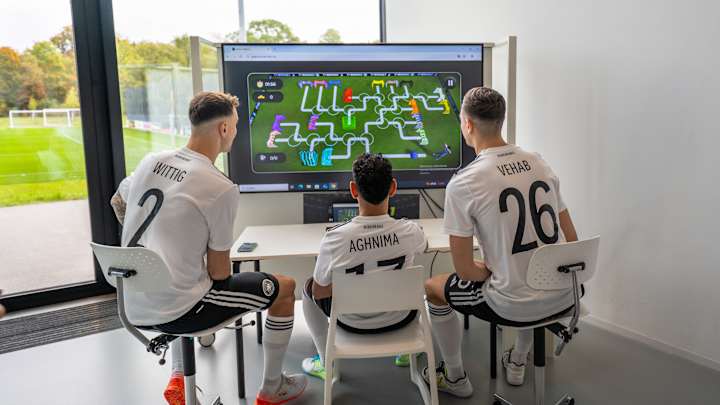
Brain1 becomes licensing partner of the German national futsal team
Brain1 is the new licensing partner of the German national futsal team. The digital platform for brain training integrates modern neuroscience and advanced cognitive training into the daily training routine of players and users.

Germany women to open World Cup qualifying campaign in Dresden
Germany's women's national team will take on Slovenia at the Rudolf-Harbig-Stadion in Dresden.
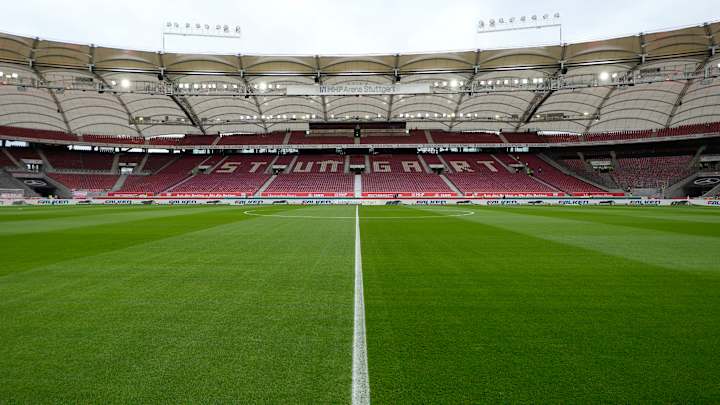
Germany to play friendly against Ghana in Stuttgart
The Germany national team are set to welcome fellow World Cup participants Ghana to the MHP Arena in Stuttgart on 30th March 2026 (20:45 CET) for a pre-tournament friendly.

Germany to play friendly against Switzerland in March
As part of their preparation for next summer’s FIFA World Cup in USA, Canada and Mexico, the Germany national side will play a friendly against Switzerland, before a second game against an as yet undetermined opponent.

FC Bayern to host RB Leipzig in the quarter-finals of the DFB-Pokal
Record winners FC Bayern will take on RB Leipzig in the next round of the DFB-Pokal, while defending champions VfB Stuttgart face a trip to second-tier side Holstein Kiel.

Germany to play group stage games in Houston, Toronto and East Rutherford
FIFA have confirmed the fixture schedule for next summer’s World Cup in Mexico, Canada and the USA.

Nagelsmann: “Not an easy group, but one we can handle”
Following the 2026 FIFA World Cup draw in Washington, Germany’s group-stage opponents are now confirmed. The team led by coach Julian Nagelsmann will face Curaçao, Côte d’Ivoire and Ecuador in Group E.

Germany to face Ecuador, Côte d'Ivoire and Curaçao at 2026 World Cup
The Germany national team have been drawn into Group E for the upcoming 2026 FIFA World Cup in the USA, Canada and Mexico. Julian Nagelsmann’s side will take on Ecuador, Côte d'Ivoire and Curaçao.
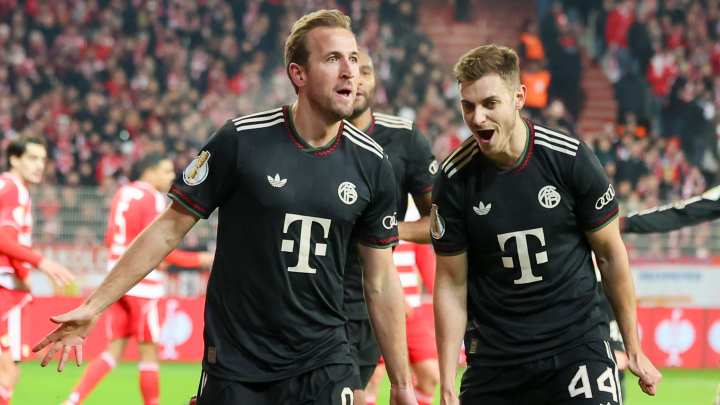
Bayern and Kiel battle to reach the DFB-Pokal’s final eight
FC Bayern München edged past Union Berlin 3-2, while Holstein Kiel prevailed 4-2 on penalties away to Hamburger SV, completing the line-up for the DFB-Pokal quarter-finals.
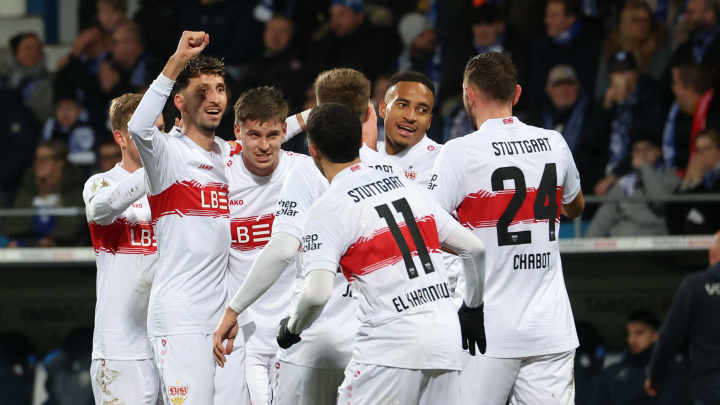
Stuttgart and Freiburg book their place in the quarter-finals
Two more teams have secured their place in the last eight of the DFB-Pokal. Holders VfB Stuttgart came through a tricky trip to second-tier VfL Bochum, while SC Freiburg also saw off SV Darmstadt 98 to move into the quarter-finals.

DFB to host UEFA Women's EURO 2029
UEFA has awarded the DFB the right to host UEFA Women's EURO 2029. The decision was taken by the UEFA Executive Committee at its meeting in Nyon on Wednesday. This means that the Women's EURO will be held in Germany for the first time since 2001.
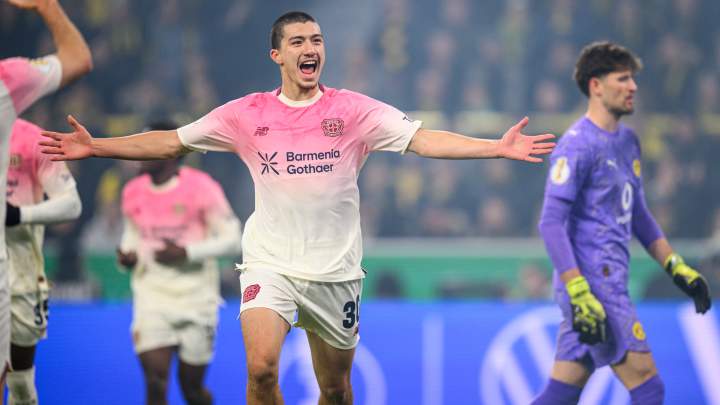
Leverkusen edge Dortmund as Leipzig come from behind
Bayer 04 Leverkusen and Borussia Dortmund booked their tickets to the quarter-finals of the DFB-Pokal on Tuesday evening.

Last international before the World Cup against USA in Chicago
Germany’s men’s national team will face hosts USA in their final international before the start of the 2026 FIFA World Cup. The match against the co-hosts will take place on 6th June 2026 at Soldier Field in Chicago.
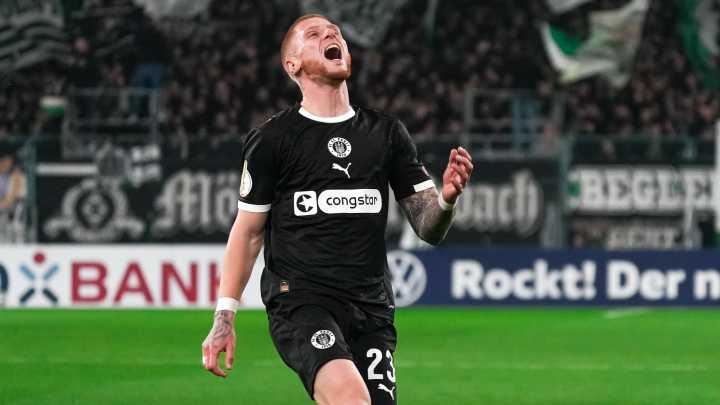
St. Pauli and Hertha into DFB-Pokal quarter-finals
The first two teams through to the DFB-Pokal quarter-finals have been confirmed, as St. Pauli and Hertha BSC advanced on Tuesday evening.

3-0 defeat against Spain in Women's Nations League final
Germany fell to a 3-0 defeat in the second leg of their UEFA Women’s Nations League final against Spain.
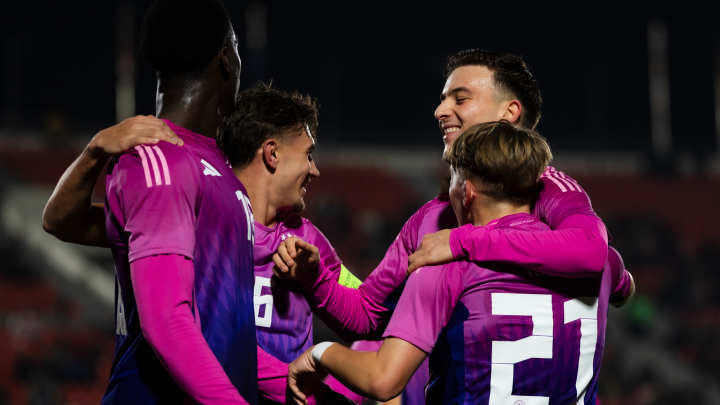
Comfortable win in Georgia for Germany U21s
Germany’s U21s are heading into the winter break with four wins from five European Championship qualifiers after a 2-0 victory away to Georgia.

Ann-Katrin Berger back for Nations League final
Germany coach Christian Wück has named his squad ahead of his side’s upcoming UEFA Women’s Nations League final against Spain, with four players making a welcome return.
.jpg%3F1763413746)
Germany beat Slovakia 6-0 to seal World Cup qualification
Germany booked their direct ticket to the 2026 World Cup in convincing fashion as group winners on Monday evening in Leipzig, running out clear 6-0 winners over Slovakia in their final qualifier.
.jpg%3F1763413444)
Nagelsmann: “Great goals and a convincing all-round display”
Germany sealed their place at the 2026 World Cup in North America with a dominant 6-0 win over Slovakia in their final qualifier, finishing top of their group. Here’s what some of the players and the head coach had to say.

Nagelsmann: “We can take a big step”
Germany can secure direct qualification for the 2026 World Cup with a victory against Slovakia on Monday night. On the day before the match, coach Julian Nagelsmann and Oliver Baumann spoke to DFB.de about their final group game.
.jpg%3F1763144036)
Three for Bischof and two for Karl: U21s cruise past Malta
The Germany U21s picked up their third win in four games in their EUROs qualifying campaign. At the Sportpark Ronhof in Fürth, Antonio Di Salvo’s side beat Malta 6-0, thanks to goals from Tom Bischof, Lennart Karl and Muhammed Damar.

Nagelsmann: “Football is a results-based sport, and we got the result we needed”
Germany’s men’s national team remain top of their Group A, after picking up three more important points against Luxembourg in their penultimate World Cup qualifier.

Woltemade at the double as Germany beat Luxembourg
Julian Nagelsmann’s side travelled to Luxembourg and came away as 2-0 winners in front of 9,214 spectators. This win means they keep their position at the top of the qualifying group.

Nagelsmann: “Tah to captain the side against Luxembourg – now he knows”
Germany want to take their penultimate step towards winning their qualifying group for the 2026 World Cup on Friday evening (kick-off 20:45 CET), when they face Luxembourg away from home.

Nagelsmann: “No more slip-ups allowed”
The Germany national team have met up in Wolfsburg for their final camp of the year ahead of their crucial World Cup qualifiers against Luxembourg on Friday (20:45 CET) and Slovakia next Monday (20:45 CET).

Road to Women’s World Cup 2027: Germany’s fixture list announced
Following last Tuesday's group draw event in Nyon, the dates for Germany's fixtures against Norway, Austria and Slovenia have been confirmed.

Bernd Neuendorf re-elected as DFB president
Bernd Neuendorf has been re-elected as president of the German Football Association (DFB). He received unanimous backing from all 253 voting delegates at the first DFB Bundestag to be held at the DFB Campus on Friday in Frankfurt am Main.

New DFB presidential board convenes
Following the conclusion of the 45th Ordinary DFB Bundestag at the DFB Campus in Frankfurt am Main, the newly elected presidential board of the German Football Association (DFB) held its inaugural meeting.

Di Salvo calls up Karl and Ibrahimovic to U21 side
Antonio Di Salvo has named his Germany U21 squad for the final international break of 2025, as the team prepare to face Malta and Georgia in qualifiers for UEFA U21 EURO 2027.

German FA Confirms Strengthened Commitment to Women’s Football
At the German Football Association (DFB) General Assembly on Friday, 7th November 2025, leaders across German football reaffirmed the organisation’s leadership and commitment to advancing women’s football across Germany.
.jpg%3F1761992392)
DFB-Pokal round of 16: BVB face Leverkusen, Stuttgart away in Bochum
The draw for the DFB-Pokal round of 16 has been made. Reigning champions VfB Stuttgart will travel to second-division side VfL Bochum, while Borussia Dortmund will take on Bayer 04 Leverkusen in an all-NRW clash.

Nagelsmann names 25-man squad for final two World Cup qualifiers
Head coach Julian Nagelsmann has called up 25 players for Germany's last two internationals of the year against Luxembourg and Slovakia.

Zalando becomes a new main sponsor of the DFB
Zalando have agreed a new partnership with the DFB, running until 2030 initially.

New adidas Germany home kit unveiled
The Germany national teams’ new home kit has been revealed by long-term DFB partner adidas. The jersey pays tribute to some of Germany’s most iconic World Cup kits and greatest tournament triumphs.

World Cup qualifying: Germany women to face Norway, Austria and Slovenia
The draw for the 2027 Women's World Cup took place today in Nyon, Switzerland. Germany will face Norway, Austria and Slovenia next year as they endeavour to book their spot in the final competition in Brazil.
.jpg%3F1761772840)
Record winners Bayern through to the round of 16
Record cup winners FC Bayern München, fellow Bundesliga sides SC Freiburg and 1.FC Union Berlin and second-tier team SV Darmstadt 98 all booked their places in the next round of the DFB-Pokal on Wednesday evening.
.jpg%3F1761770044)
Fourth-division side Illertissen fall short against Magdeburg
Regionalliga Bayern side FV Illertissen missed out on another upset in the second round of the DFB-Pokal. Elsewhere, Bayer Leverkusen, VfB Stuttgart and 1. FC Kaiserslautern all progressed.

2-2 draw in France sees Germany reach Nations League final
Germany’s women’s national team are through to the UEFA Women’s Nations League final for the very first time. After winning the first leg 1-0, a 2-2 draw in Caen was enough for Christian Wück’s side to book their place in the final.

Leipzig, Gladbach, Bochum and St. Pauli through to round of 16
Four more sides progressed to the round of 16 in the DFB-Pokal following an action-packed evening on Tuesday.

Dortmund reach last 16 after penalty shootout
Dortmund, Kiel, HSV and Hertha BSC became the first sides to advance to the round of 16 in the DFB-Pokal on Tuesday evening.

Bühl strike gives Germany first-leg win over France
Germany’s women’s national team have taken a big step towards the UEFA Women’s Nations League final thanks to a 1-0 win over France in the first leg of their semi-final.

Oberdorf suffers ACL tear, Dallmann called up to take her place
Medical tests held in Munich on Monday confirmed that the midfielder is set for an extended spell on the sidelines after tearing the ACL in her right knee.

U21s come from behind to win 2-1 in Northern Ireland
Germany’s U21 national team recorded their second win in three European Championship qualifiers. Antonio Di Salvo’s side came from behind to beat Northern Ireland 2-1 in Belfast, with goals from Assan Ouédraogo (79’) and Dzenan Pejcinovic (83’).

Three newcomers and four returnees called up for Nations League semi-finals
Head coach Christian Wück has named his squad for the upcoming UEFA Women's nations league semi-finals against France.
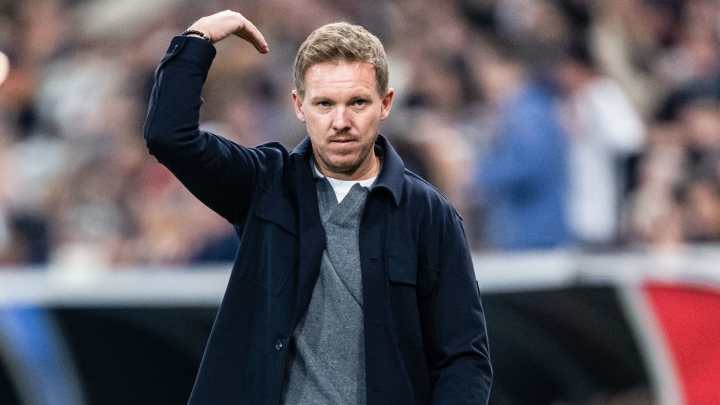
Nagelsmann: “A valuable learning experience and a big step forward”
Germany earned a hard-fought 1-0 win over Northern Ireland in an intense contest at a raucous Windsor Park in Belfast. Julian Nagelsmann reflected on the lessons learned afterwards.
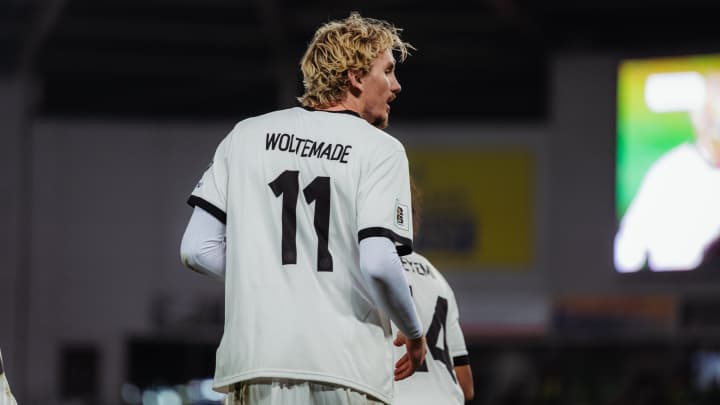
Woltemade: “That goal was really important for me.”
The Germany national side got a step closer to qualifying for next year’s World Cup with a 1-0 win over Northern Ireland. Here is the reaction to Monday night’s game in Belfast.
.jpg%3F1760389455)
Tenacious spirit and Woltemade’s shoulder enough to secure victory in Northern Ireland
Germany beat Northern Ireland in Belfast last night, with Nick Woltemade's goal proving enough to separate the sides in their fourth World Cup qualifying fixture.
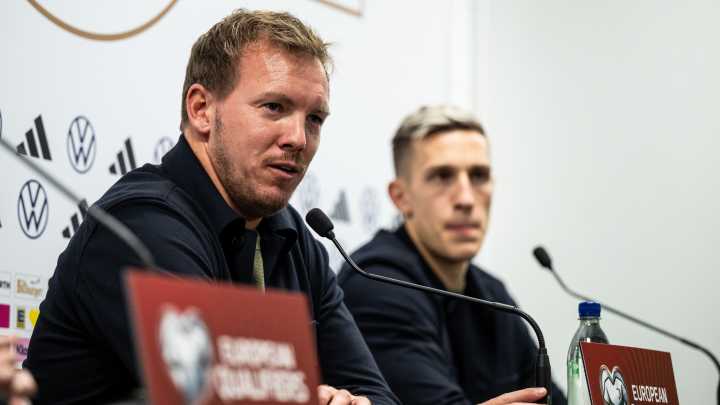
Nagelsmann: “We need a strong performance to win tomorrow”
Head coach Julian Nagelsmann and centre-back Nico Schlotterbeck spoke to the media on the eve of Germany’s World Cup qualifier against Northern Ireland in Belfast on Monday (20:45 CEST).
.jpg%3F1760116018)
U21s suffer defeat to Greece despite attempt at comeback
Germany U21 fell 3-2 to Greece in their second EUROs qualifier. Despite coming back to level the game from two goals down, Germany couldn't do enough to avoid defeat in Jena.
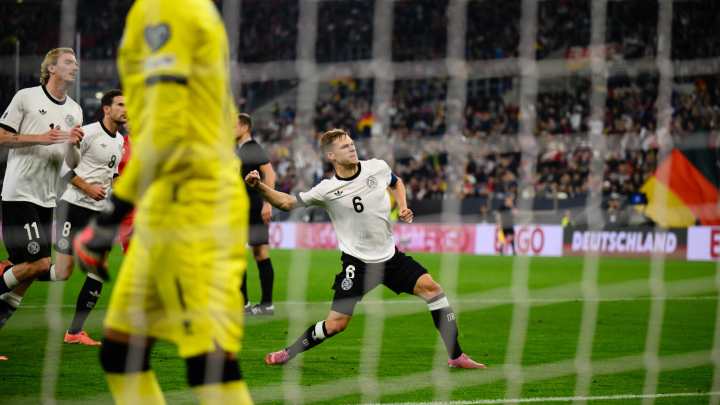
Statement 4-0 victory over Luxembourg in Sinsheim
Germany put in a convincing performance on Friday night in Sinsheim to defeat Luxembourg 4-0, thus picking up another crucial three points in their World Cup qualification campaign.

Nagelsmann: “A deserved win – one which we needed”
Germany impressed tonight with a 4-0 victory against Luxembourg in Sinsheim. DFB.de gathered the post-match reactions from Julian Nagelsmann and the team.

Nagelsmann: “I’m expecting a strong opponent”
Germany are preparing for the third match of their World Cup qualifying campaign as they take on Luxembourg in Sinsheim on Friday (20:45 CEST). Julian Nagelsmann and Serge Gnabry spoke at the pre-match press conference on Thursday.

Sara Däbritz announces her retirement from international football
After many successful years playing for the Germany women’s national side, Sara Däbritz has announced that she will be taking a step back from international football. The 30-year-old made her debut in 2013, and since then has played 111 times.

Collins and Wanner called up for U21 EUROs qualifiers
The U21 side will take on Greece and Northern Ireland in their two EUROs qualifiers during October’s international break, as they look to book their place in the tournament which will take place across Albania and Serbia in 2027.
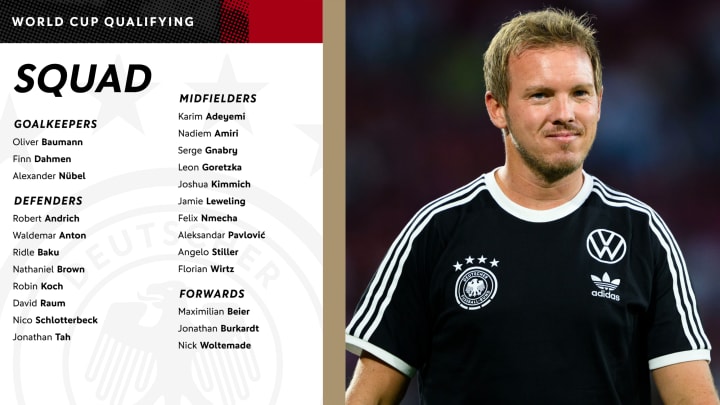
One newcomer and five returnees set to face Luxembourg and Northern Ireland
Germany head coach Julian Nagelsmann has announced his 24-man squad as the side prepare to take on Luxembourg and Northern Ireland in World Cup qualifying fixtures.
.jpg%3F1758315809)
World Cup winner Boateng announces retirement
2014 World Cup winner Jérôme Boateng has announced the end of his playing career.
.jpg%3F1757448659)
U21s kick off EUROs qualification with stunning win as Tresoldi bags hat-trick
The Germany U21 national team have begun their European U21 Championship qualifying campaign with what can only be described as a perfect start after securing a 5-0 victory over Latvia in Rostock.

Nagelsmann: “We had to win this game, and we did just that”
Germany’s World Cup qualifier against Northern Ireland ended in a hard fought 3-1 win. Head coach Julian Nagelsmann spoke to DFB.de to discuss his thoughts after the game.

Amiri: “We stood our ground”
Germany delivered the response they were looking for after losing 2-0 to Slovakia in their World Cup qualifying opener. Julian Nagelsmann’s team bounced back with a 3-1 win over Northern Ireland in Cologne.
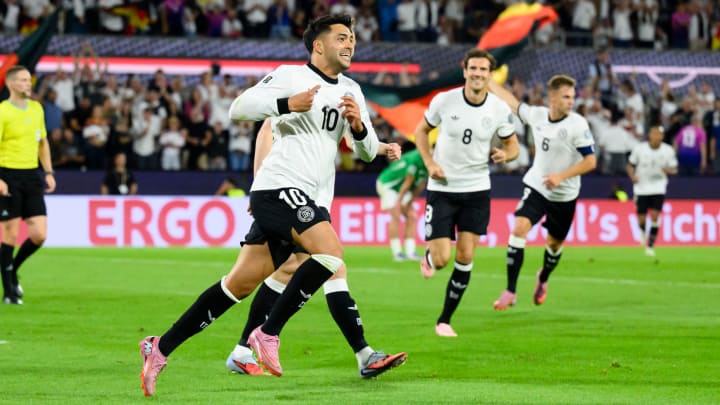
Germany beat Northern Ireland 3-1 in Cologne
Germany got their World Cup qualifying campaign up and running with a 3-1 victory over Northern Ireland in front of 43,169 fans in Cologne. Serge Gnabry, Nadiem Amiri and Florian Wirtz got the goals.

World Cup winner with a mind to match his head: thank you, Mats Hummels!
Mats Hummels will receive an official send-off from the DFB before Germany's World Cup qualifier against Northern Ireland on Sunday night.

Nagelsmann: "We have to encourage each other"
Head coach Julian Nagelsmann and goalkeeper Oliver Baumann spoke at the pre-match press conference ahead of the match against Northern Ireland.


.jpg%3F1720007147)


























.jpg%3F1653759824)


